Bootstrapping A $10m Furniture Company In Under Two Years With Zero Ad Spend
He and his co-founder turned their $7.5k initial investment into a $10m+ company (with healthy margins and offices on two continents), in under two years, with no social media, and zero ad-spend.
.png)
There's a thing that people in the startup world all know but rarely talk about, and it's kind of crazy: A lot of multimillion-dollar venture-backed startups barely make money.
Seven figures in revenue? The founder still doesn't draw a paycheck. That big funding round you heard about? It's because they're burning cash. The whole system is built to foster ideas that could make money, rather than companies that actually do.
And thank god for that -- venture dollars help bring a lot of ideas into the world. But there's a reason you see so many experienced entrepreneurs gravitating to so-called "boring businesses" these days. They print cash.
Today's interview is with one of those.
Hampton member Luca Pallattella is the co-founder of Workshop Hospitality, a company that makes furniture for hotels and casinos. He's got experience in venture -- growing a D2C cannabis brand to an eight-figure exit. But after that, he wanted to build something simpler. Something that made money out of the gate, and that capitalized on his relationship-building skills.
He and his co-founder turned their $7.5k initial investment into a $10m+ company (with healthy margins and offices on two continents), in under two years, with no social media, and zero ad-spend.
Here's how...
Hello! Who are you and what business did you start?
Hey! My name is Luca and I run a company that manufacturers custom furniture for Hotels, Casinos, and Restaurants. Previously, I helped run an investor backed cannabis CPG startup that was acquired within ~2-years (Ace Valley).
Our customers are 4- and 5-star interior designers and procurement agents. Collectively, they design and purchase all furniture for large commercial projects. Our job is to offer an elevated service, quality, and experience that brings their furniture vision to life.
We started this company with $7.5k a year and a half ago. We are on-track for $10M+ in revenue this year, with offices in Latin America / Asia.
What's your backstory and how did you come up with the idea?
After dropping out of college, I got a job working as a beer delivery driver for a craft beer upstart through a good friend. As one of their initial employees, I had the opportunity to work very closely with 4 experienced and successful founders. Through effort and results, I ultimately had the opportunity to run their sister company (Ace Valley) alongside one of the founders. Together, we grew that company to 8-figures in revenue over 14 months, which ultimately led to a high 8-figure acquisition within two years.
That gave me the opportunity to really think through what I wanted to do next. My focus was to build something that not only I was passionate about, but also checked all the boxes of what I believe would lead to a successful business based on my skill set.
Those boxes were:
- A large market predominantly served by SMB’s
- Contract-based sales that had large ticket value on a per-sale basis
- Limited upstart costs driven by customer payment terms
- An opportunity to out-execute existing competitors based on the offering
In thinking through these characteristics, I landed on custom contract furniture.
Because everything is custom built, it requires 50% deposits [from customers]. So I could essentially open the doors (after finding my facilities and infrastructure) and never have to take money out of my pocket to get going.
Take us through the process of building and launching the first version of your product.
Although I had a windfall from our previous exit, I kind of just wanted to start new and not sink everything into the next thing. I was willing to sacrifice my time in order to do that.
We had a limited budget to spend, so we knew we had to package a strong value proposition that addressed a lot of the underserved elements of the industry we were in.
So ultimately what I did is I went door knocking to interior designers in Toronto and simply asked them, "What are the pain points that you're feeling?" And then also got my hands on some manufacturers and spoke to them as well.
Ultimately [we found that] the industry is dominated by so-called "small businesses," but they're not small. They're family-run businesses that do $50m-$60m a year, that have not moved for the last 40 to 50 years.
There's been no new incumbents in this space in like 25 years. And as a result, their demand is so big, they don't give a fuck at all. They have these big contract orders that aren't really serviced on a seven figure basis.
So I said if I could use a little bit of technology and organization to provide transparency and visibility to these customers... it would at least give us an angle and allow us to compete in a different area than our competitors.
When this story and proposition was put together, we spent the first 6-months picking up the phone and calling customers across North America to get our first set of customers.
What did you spend the $7.5k on?
The website. That's all it went to.
The plan was like, "Okay. If we can pull this off with no money and just our [sales calls], then we're onto something." That's kind of the way I like to approach things instead of like, throwing a whole bunch of money at something and not understanding if it works.
To get our first set of customers, we wanted to be super creative, and we didn't wan to send emails, and we didn't wan to start cold calling out of nowhere. We wanted a way to stick out.
So what we ended up doing was we created a mold of a shoe and filled that mold with wax and put a candle in it, then wrote a handwritten note that said, "Love your company, yada, yada, yada. I'm sending you this because I want to get my foot in the door."
That had like an 80% hit rate out the gate just by sending that. From there, our first impression on these clients was, "these guys are creative, fresh and new."
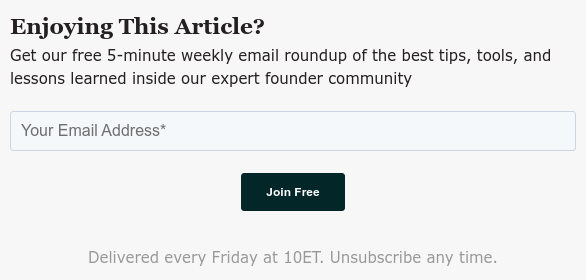
We took follow-up calls with everyone, but only used those calls for introductory calls – didn't ask them for a thing. And, you know, 12 months later I'd say we're doing projects with a fair share of them and a lot of other ones in the pipeline.
Unlike many new-business, we have not invested or utilized social media or marketing at all ($0 dollars spent).
The sales cycles in our business are long (can be 2-years in some cases), and for this reason, we quickly understood that the most effective path forward for growth would be to connect with as many people as possible.
Through the last 12-months, we have traveled across Canada and the US, shaking hands and introducing ourselves to as many customers as we could. For the most part, we have been cognizant to not hard-sell any customers, but rather introduce our company and our brand and why we believe we are better.
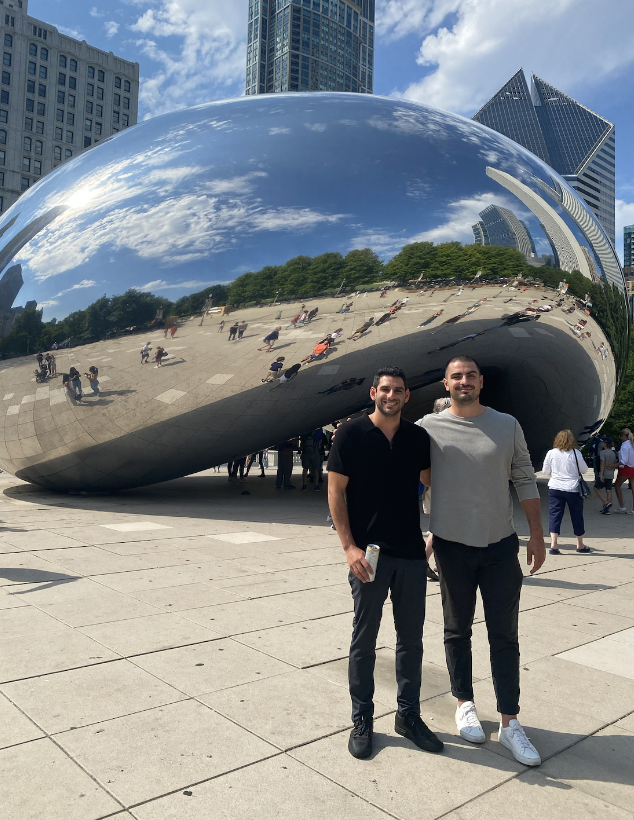
Following these meetings, we simply keep them posted on the projects we are completing, and overtime, requests started to flow in!
Tell me about how you stay in touch with prospects
I've never been a fan of the hard sale. I've always believed that you never really have to sell somebody. You just gotta build a relationship with 'em, provide a good service, and be there when you need to be.
Sales is almost more about organization and consistency than it is about, uh, creativity and like, you know, automated fucking emails.
I think people should take the effort and customize every single email personally. Not just in the first sentence.
So that requires detailed notes – keeping notes of what the person likes, what they don't like, and finding the opportune moment when to hit them. Instead of just following up in three weeks because Salesforce says follow up in three weeks, [you should go] to people with something, always.
Our customers are very visual. So we keep highlights in our CRM of what each designer or purchasing group is looking for. And when we have those items... all we do is go to our CRM, filter it and see who wants to see those photos, then follow up and say, "I know you want to see some loungers. Here's some that came off our line. Just thought I'd share."
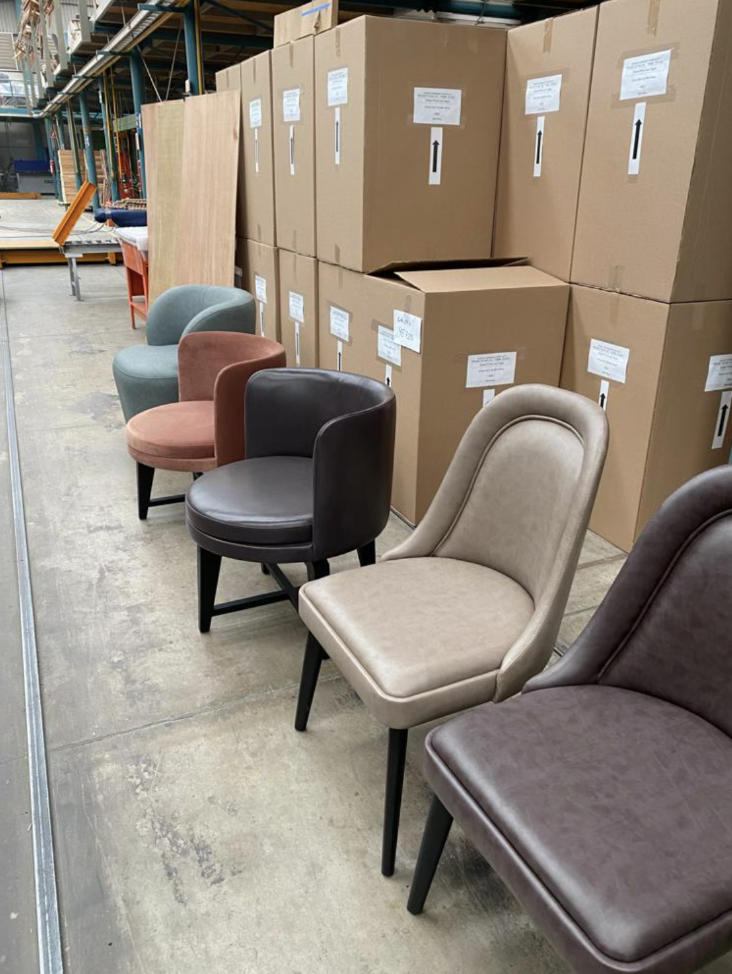
I learned that from my experience at the cannabis company. You always need to follow up with something. Don't just say like, "Hey, just checking in." You need to give them something. Give them a reason to talk. Add some sort of value anywhere. Help them out.
That's how we typically do it.
Did you ever have an “oh shit” moment where you thought it wouldn’t work?
I am a very emotional person. In starting this business in the first year, the complexity of understanding a new market, overseas manufacturing, and logistics left me sleepless for nights on end.
We manufacture all of our goods in Latin America and Asia, so setting up an office in both regions met regulatory and logistical challenges too. We were packing all textile shipments ourselves - over 100 rolls per project (picture of my partner below on our first order).
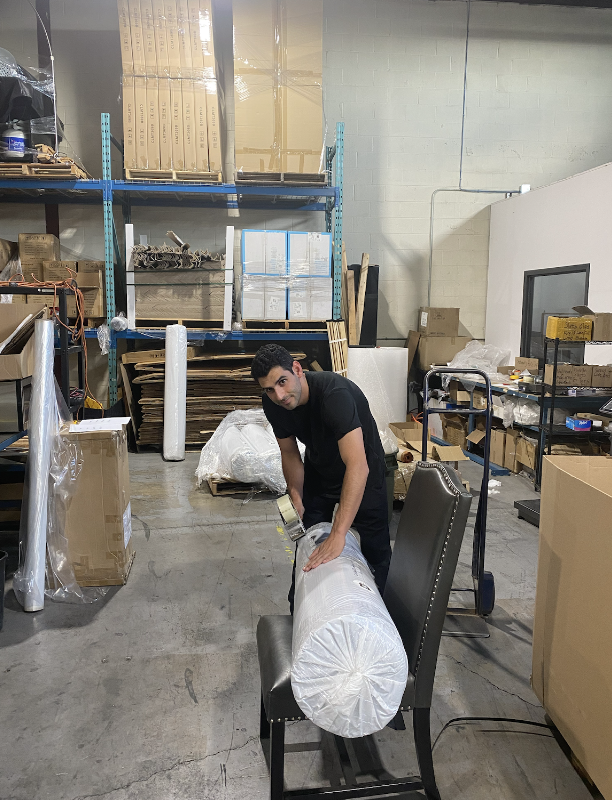
What we realized quickly is that although we were able to obtain sales, solving for an optimized and smooth supply chain would be most difficult. Through many failures (and luck), we have been able to put ourselves in a position to work with great partners and team members who have built out an incredible system so far.
I see business as a puzzle. Some are harder than others. But if you focus on the challenges for long-enough, you are going to figure it out and that is where we are at now.
Can you break down the keys to this business model for us? What makes it work? And What do outsiders typically not understand about your industry?
Because all of our business is custom and every single piece of furniture will never be priced the same, it allows us to become very strategic with our gross margins. Other variables to consider is where the items are manufactured as well.
Today, we have an office in Mexico / Asia / and Canada. All of which are dedicated to the support and service of our projects dependent on the project scope.
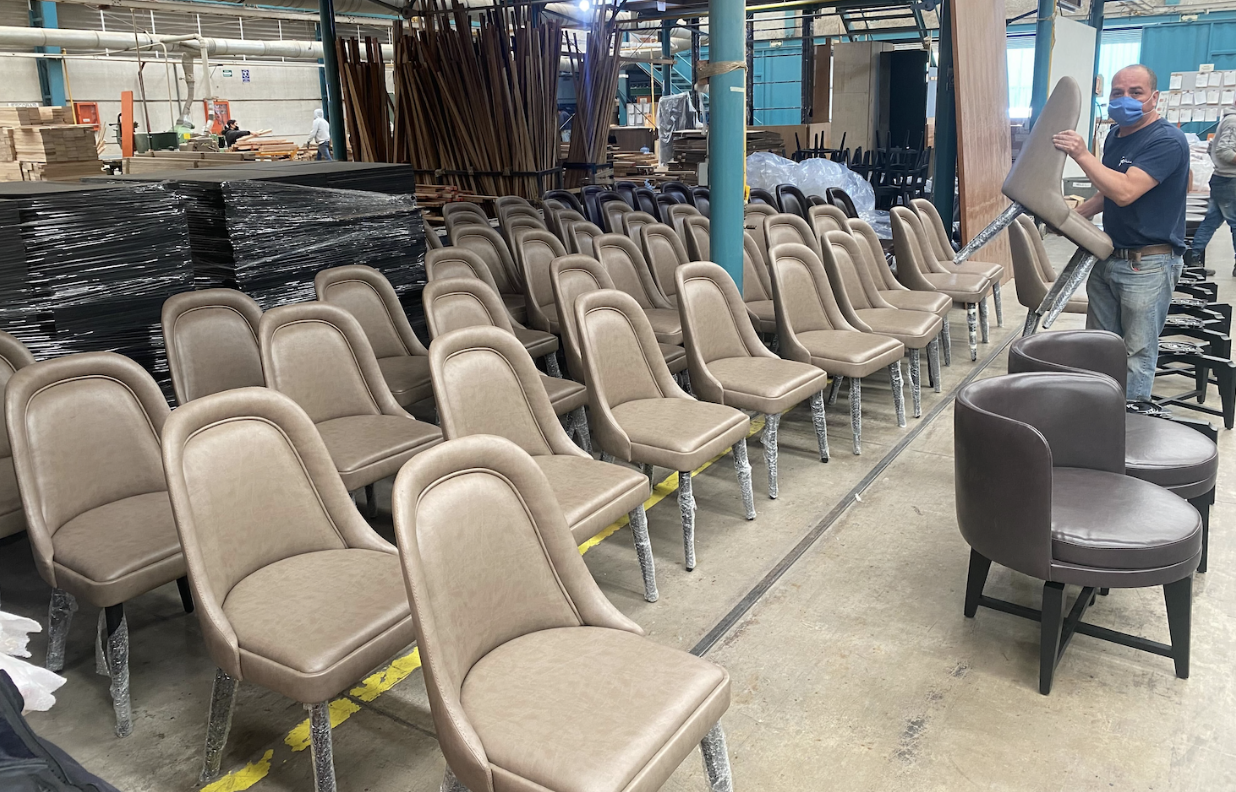
I think for us, service and transparency to our customers is the most important thing. Our projects often are 7 figures and can last up to 10-months long + and we often hear that competing manufacturers provide no service behind that. For us, our emails and phones are open 24/7 with every customer we work with and it is something I believe is critically important in our industry. Additionally, providing transparency to our customers throughout their process is something we prioritize.
What have been the most influential books, podcasts, or other resources?
The Hard Things About Hard Things is the best business book I have ever read.
What are some strong opinions you have about leadership, and how do you actually put those into practice in your company?
I may be naive, but I think it is important to harmonize your personal life with your business. My team knows everything going on in my life and I know everything going on in theirs. Some may see this unprofessional, but I believe it helps us create an environment that is supportive and hard working.
We are working for each other.
As for myself, I prioritize chatting with the team and ensuring that my door is open 24/7.
Where can we go to learn more?
https://www.linkedin.com/company/workshop-hospitality/mycompany/?viewAsMember=true
Personally, I find being the CEO of a startup to be downright exhilarating. But, as I'm sure you well know, it can also be a bit lonely and stressful at times, too.
Because, let's be honest, if you're the kind of person with the guts to actually launch and run a startup, then you can bet everyone will always be asking you a thousand questions, expecting you to have all the right answers -- all the time.
And that's okay! Navigating this kind of pressure is the job.
But what about all the difficult questions that you have as you reach each new level of growth and success? For tax questions, you have an accountant. For legal, your attorney. And for tech. your dev team.
This is where Hampton comes in.
Hampton's a private and highly vetted network for high-growth founders and CEOs.





